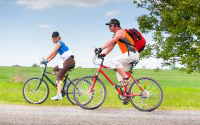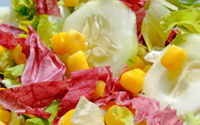3 STEPS TO EATING & MOVING YOUR WAY TO HEALTH & HAPPINESS
by Annie Lawler
In today’s economic and social climates, many of us fail to look after our physical and mental health, leaving us susceptible to undue stress, illness and poor energy levels. The result is that we are less effective than we can be and life is a lot less enjoyable.
I can hear the cries of, ‘but I haven’t got time!’ But the truth is, we always find time to pay attention to what we really want to do. The simple fact is that eating nutritious foods and physical activity keep our minds and bodies working well.
As I say to delegates who attend my seminars, “If you compare your body to a car, it needs the right fuel and regular servicing to perform at its best. You can’t put diesel in a petrol engine, keep your foot flat on the accelerator and expect it to perform at its best”. But not only that, getting physical and eating well can be great fun and open new social opportunities!
So, let’s take a look at what foods are good for you and why it’s wise to make healthy eating a priority.
1. Always Eat Breakfast
Breakfast is one of those meals that many of us either forego or eat very hurriedly, snatching whatever is easiest and quickest. Missing breakfast actually contributes togaining weight and also affects our energy levels adversely. We’ve just been asleep for 7 or 8 hours and our blood sugar levels are low.
Eating breakfast in the morning kicks off the body’s systems. If you don’t eat, your metabolism slows down because your body is in starvation mode and holds on to the nutrients it has.
Eating proteins for breakfast will boost your brain’s levels of dopamine and make you feel alert. For example, you can choose from eggs, bacon, cold meats, mushrooms or tomatoes, or sprinkle your yoghurt with nuts and seeds.
2. Eat Plenty of Freshly Prepared Foods
There are a lot of foods available which look and taste great, but which may have lost a lot of their nutrients in processing, transport and preparation. Many of them are also loaded with chemicals, colourings, preservatives, salt, sugar and so on and when we haven’t prepared them ourselves it’s difficult to know just what’s in the foods we eat.
For example, packaged salads are often sprayed with chlorine to keep them looking fresh in the bag longer and many cereals and pre-prepared foods are loaded with salt and sugar.
Of course, you want to enjoy your food and want to enjoy the convenience of ‘fast foods’ when you’re busy, but the fresher the foods and the less processed they are, the more able our bodies are to digest them and process them healthily.
There are lots of ways of enjoying really good, healthy and fresh foods which don’t take long to prepare – fish for example cooks really quickly and is very nutritious and stir frys are excellent. Sure, you have to do a bit of chopping, but it doesn’t take long and
preparing foods can be fun. Instead of a sandwich at lunchtime, eat a homemade or organic soup or freshly prepared salad, or try a jacket potato with tuna or beans.
It’s not that one has to be a saint and never have take-away or prepared foods – let’s face it, some of them are quite tasty and used occasionally, they are fine. However, we do need to understand what affects the nutritional values of food and what they do to our bodies and our mental capacity to perform.
3. Move Your Way to Better Performance
As far as physical activity is concerned, this is a really important part of maintaining good health and efficiency. Exercise not only tones our bodies, it also :
– Helps eliminate toxins
– Helps reduce stress
– Helps promote the production of endorphins (the ‘happy hormone’)
– Is an investment in your future health and wellbeing. Recent studies have shown that exercise in youth and middle age usually means better health in your older years
– Helps you feel good. If you feel good about the way you look, you feel better.
It’s just a matter of taking care of yourself and directly affects your ability to perform and enjoy life to the full. In the long run, you’ll be doing yourself a favour..
The recommended rate of exercise for good health is 20 minutes exercise, 5 days a week, but this needn’t be a drudge and can be good fun. It also doesn’t necessarily mean going to the gym. It just means being active and that can be done in numerous ways. So choose something that you feel good about and enjoy.
Walking, for example, uses all the body’s muscles and uses up about 500 calories an hour. Yoga, Tai Chi and Qi Gong etc are all good forms of exercise, which also incorporate breathing techniques, which are extremely useful in reducing stress levels, panic, anxiety and so on and help nourish the body and free it from toxins.
If these don’t turn you on, dancing can be great fun. There are dance centres all around the Country, teaching a wide variety of dance styles from ballroom to ballet and salsa to street dance. Or you might prefer to take part in a sport such as squash or tennis or a team sport like football, hockey, netball or basketball. A lot of these activities also have a great social life attached to them, so there are even greater benefits to being involved.
But if you’re not interested in this type of thing, there are plenty of ways you can get active without leaving home. Housework, gardening and DIY are just some ways of keeping moving. You can also build activity into your daily routine by walking up stairs in favour of taking lifts and so on, so get creative and find something that works for you.
Whatever form your exercise takes, make sure it’s regular and that it’s something you enjoy.
Remember, every time you make a small step towards paying attention to what you eat and your activity time, you’re investing in your long terms health AND your short term performance and enjoyment. That means you get more out of life and so do the people around you, because you’ll be more fun to be around.
If you genuinely feel constantly under excessive pressure and that you have no time to fit everything in, then something needs to change or you will eventually make yourself ill. Battling on through for short periods might be necessary, but this cannot be sustained over long periods without damaging our health, enjoyment and efficiency. If this is the case, you will need to ask for help from a manager, mentor or coach to help you identify what you can do to get back in control of the situation. It is not ‘weak’ to ask for help, just a recognition that something needs to change.
Conclusion
What we eat & drink and how active we are directly affects our health, levels of happiness and our performance. The benefits of physical activity and how we nourish ourselves, not only affect our physical wellbeing but also our mental capacity and our stress levels. With many of us leading sedentary lifestyles, few of us give priority to these crucial areas of our health. It’s time to change.
Whilst take-away and fast foods have convenience benefits, there are a lot of unhealthy additives and therefore limiting your intake of these is recommended. Instead,
concentrate on eating fresh, unprocessed foods which your body finds easier to digest and many of them are quicker to prepare than you might imagine.
Being physically active needn’t necessarily mean going to a gym. There are lots of ways you can get active, even without leaving your home!
Many people say they don’t have time to focus on these aspects of their lives, but if we want to do something, we always make time. The crucial question is, with so much being demanded of us in our full lives, can you afford NOT to make your health and wellbeing a priority?
About the Author:
Annie Lawler is founder of Breathing Space. Annie empowers clients to get back in the driving seat & to restore calm, clarity & confidence to their lives.
Annie runs a series of monthly webcasts which reveal the secrets of happy, effective and healthy living. For more information contact annie@breathingspaceforbusiness.com, visit www.breathingspaceforbusiness.com or call on 0772 581 8884.



